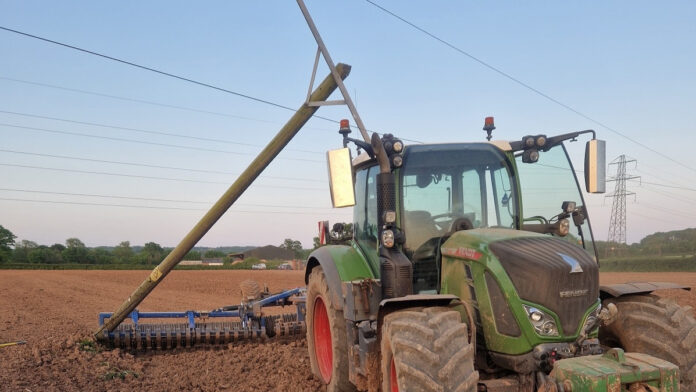
During Farm Safety Week (22 – 26 July) and the Royal Welsh Show (22 – 25 July), Welsh farmers are being urged to ‘look out, look up’, and stay safe around electrical equipment to avoid the risk of accidents.
Every year, National Grid Electricity Distribution – the electricity operator for South Wales, the Midlands and South West – is called to incidents in which farm vehicles have collided with overhead power lines. It is estimated that at least one agricultural accident involving overhead lines is reported every day in the UK.
One of these reports was at Laugharne, Carmarthenshire, when a harvester collided with a high voltage conductor, leaving the overhead line on the ground. After being made safe, the conductor was re-erected at an increased height to make sure farm machinery could pass safely underneath the power line. No one was injured.
At a farm in Tenby, Pembrokeshire, emergency repairs had to be carried out to overhead lines and conductors after a tractor hit an electricity pole. No one was injured.
As farm machinery continues to increase in size, the distance between equipment and nearby power lines is at risk of reducing, meaning that accidents could be more likely.
Paul Woodward, Safety Manager for National Grid Electricity Distribution, said:
“Every year, our engineers and technicians are called to incidents involving farming equipment and overhead power lines.
“Accidents involving the electricity supply can have devastating consequences, so it’s really important that the farmers ‘look out’ and ‘look up’ – particularly when working with big or heavy machinery.
“We are committed to ensuring that farm workers have the knowledge and resources they need to get home safe every day, and will continue to work with farming communities in South Wales and across the country to reduce incidents involving our power lines.”
As part of National Grid’s farm safety campaign, the operator has outlined five simple steps to ensure farmers stay safe when working close to power lines:
- Never raise elevating equipment, such as spray booms, cabbage harvesters and trailer bodies, under or close to overhead power lines.
- Never store or move materials under, or close to, overhead power lines, as this reduces the safe clearance distance beneath the overhead lines.
- Know the maximum reach and height of any vehicle you are operating, and be vigilant when using GPS – accidents can still happen.
- You cannot see electricity – the area around a fallen line, including the soil, equipment and other objects, could be live – so stay away.
- If contact is made with a power line, farm workers are advised to stay in the cab and try to drive clear. If that is not possible, the driver should stay in the cab and telephone 105, only leaving the machine in an emergency. When leaving the vehicle, they should take care not to hold the machine and touch the ground at the same time, and take leaping strides so one foot is clear from the ground at all times – or ‘bunny hop’ away with both feet kept together.
Farmers are also encouraged to use the ‘What3Words’ app, which allows farmers to pinpoint the exact location of an incident. This means that network engineers can isolate the power in seconds using remote technology, therefore reducing the risk of accidents and threat to life.
National Grid will be at the Royal Welsh Show all week offering safety advice and giving out stickers to put in the cab of vehicles with a reminder of how to stay safe when working near power lines.
Farmers can find out more about National Grid’s safety advice and access additional resources at National Grid – Farming safety.
Help keep news FREE for our readers
Supporting your local community newspaper/online news outlet is crucial now more than ever. If you believe in independent journalism, then consider making a valuable contribution by making a one-time or monthly donation. We operate in rural areas where providing unbiased news can be challenging. Read More About Supporting The West Wales Chronicle





















